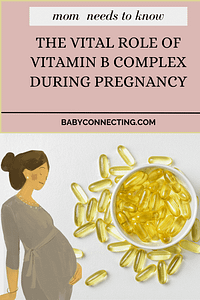The Vital Role of Vitamin B Complex During Pregnancy

Introduction:
Pregnancy is a time of profound physiological changes, demanding increased nutritional support to ensure the health and well-being of both the mother and the developing baby. Among the essential nutrients needed during this crucial period, the B vitamins play a particularly significant role. The Vitamin B complex, consisting of eight B vitamins, is essential for various bodily functions, including energy metabolism, nervous system health, and fetal development. In this blog post, we’ll explore the importance of vitamin B complex during pregnancy, its benefits, potential drawbacks, and provide insights backed by research and expert opinions.
Benefits:
1. Energy Production: The B vitamins, particularly B1 (thiamine), B2 (riboflavin), B3 (niacin), B5 (pantothenic acid), and B6 (pyridoxine), are involved in energy metabolism, converting carbohydrates, fats, and proteins into usable energy. During pregnancy, energy requirements increase to support the growth and development of the baby and to sustain the mother’s heightened metabolic demands. Adequate intake of B vitamins helps ensure optimal energy production, combating fatigue and supporting overall maternal vitality.
2. Neurological Development: Folate (B9) and vitamin B12 are crucial for neurological development, particularly during the early stages of pregnancy. Folate plays a vital role in preventing neural tube defects, such as spina bifida, by supporting proper neural tube closure in the developing embryo. Vitamin B12 is necessary for the formation of myelin, a protective sheath around nerve fibers, and for the synthesis of neurotransmitters. Ensuring sufficient intake of these vitamins is essential for preventing developmental abnormalities and supporting optimal brain function in the baby.
3. Red Blood Cell Formation: Vitamin B12 and B6 are involved in the synthesis of red blood cells, which are vital for oxygen transport throughout the body. During pregnancy, blood volume increases to accommodate the needs of the growing fetus, placing greater demands on red blood cell production.
Adequate intake of vitamin B12 and B6 supports the body’s ability to produce healthy red blood cells, reducing the risk of anemia and ensuring optimal oxygen delivery to the baby.
4. Immune Function: Several B vitamins, including B6, B9, and B12, play essential roles in immune function. They support the production and activity of white blood cells, which are the body’s primary defense against infections and illness.
Maintaining a healthy immune system during pregnancy is crucial for protecting both the mother and the baby from harmful pathogens and reducing the risk of complications.
5. Mood Regulation: B vitamins, particularly B6, are involved in neurotransmitter synthesis and mood regulation. Adequate intake of vitamin B6 has been associated with a reduced risk of mood disorders such as depression and anxiety during pregnancy.
Supporting maternal mental health is essential for overall well-being and can positively impact fetal development and birth outcomes.
Pros and Cons:
Pros:
– Vitamin B complex supports energy production, neurological development, red blood cell formation, immune function, and mood regulation during pregnancy.
– Adequate intake of B vitamins can help prevent birth defects, support maternal vitality, and reduce the risk of complications.
– B vitamins are found in a variety of foods, making them accessible and easy to incorporate into the diet.
Cons:
– Excessive intake of certain B vitamins, particularly B6 and B12, may have adverse effects and should be avoided.
– Some individuals may have difficulty absorbing or metabolizing B vitamins due to underlying health conditions or genetic factors.
– Pregnant women should consult with their healthcare provider before starting any vitamin B supplements to ensure they are appropriate and safe for their specific needs.
Key Pointers:
– Vitamin B complex is essential for various bodily functions, including energy metabolism, neurological development, and immune function, during pregnancy.
– Adequate intake of B vitamins supports maternal vitality, fetal growth, and reduces the risk of complications such as neural tube defects and anemia.
– Pregnant women should prioritize a balanced diet rich in B vitamin-containing foods, such as whole grains, leafy greens, legumes, and lean proteins, to meet their nutritional needs.
Research studies have demonstrated the importance of vitamin B complex during pregnancy and its impact on maternal and fetal health. For example, a meta-analysis published in “Obstetrics & Gynecology” found that folic acid supplementation reduced the risk of neural tube defects by 72% (Obstet Gynecol. 2010 May;115(5):917-23).
Another study published in “Nutrients” highlighted the association between vitamin B12 deficiency during pregnancy and adverse birth outcomes, emphasizing the need for adequate B vitamin intake (Nutrients. 2016 Feb; 8(2): 80). These findings underscore the critical role of vitamin B complex in promoting healthy pregnancies and supporting optimal outcomes for both mothers and babies.
In conclusion, vitamin B complex is a cornerstone of prenatal nutrition, providing essential support for maternal vitality and fetal development. From energy metabolism to neurological function and immune health, B vitamins play myriad roles in ensuring a healthy pregnancy journey. Pregnant women should prioritize a balanced diet rich in B vitamin-containing foods and consult with their healthcare provider to address any specific nutritional needs or concerns.
By prioritizing adequate intake of vitamin B complex, expecting mothers can lay the foundation for a healthy pregnancy and a thriving baby.
References:
1. De-Regil, L. M., Fernández-Gaxiola, A. C., Dowswell, T., & Peña-Rosas, J. P. (2010). Effects and safety of periconceptional folate supplementation for preventing birth defects. Obstetrics & Gynecology, 115(5), 917-923.
2. Wierzejska, R., & Jarosz, M. (2016). The impact of maternal diet and perinatal factors on neonatal outcome: a review. Nutrients, 8(2), 80.
3. Institute of Medicine (US) Standing Committee on the Scientific Evaluation of Dietary Reference Intakes and its Panel on Folate, Other B Vitamins, and Choline. (1998). Dietary Reference Intakes for Thiamin, Riboflavin, Niacin, Vitamin B6, Folate, Vitamin B12, Pantothenic Acid, Biotin, and Choline. National Academies Press (US).
4. Hall, M. H., Rajasekar, A., & Thakkar, N. (2020). Vitamin B6. In StatPearls [Internet]. StatPearls Publishing.
5. Kumar, N., Gupta, S., Kishore, J., Gupta, A., & Arora, A. (2016). Vitamin B12 deficiency and depression in the elderly: review and case report. Journal of Clinical and Diagnostic Research: JCDR, 10(8), Vr01.
6. Obeid, R., & Herrmann, W. (2006). Homocysteine and lipids: S-adenosyl methionine as a key intermediate. FEBS Letters, 580(17), 4160-4163.
7. Dawson, E. B., Albers, J. N., McGanity, W. J., & Sadowski, J. A. (1997). Serum zinc changes due to iron supplementation in teenaged pregnant women. Nutrition Research, 17(3), 443-449.



